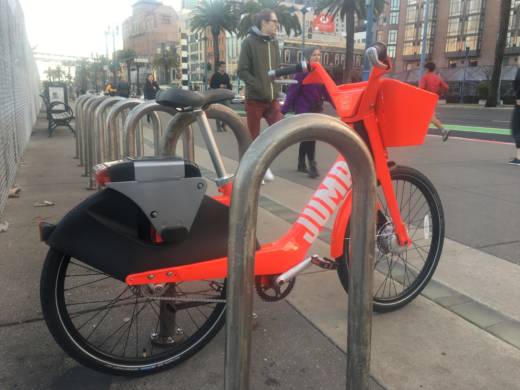The transportation agency says it plans to use the pilot to see how stationless bike rentals work in the city and to map future policy for such systems.
Agency spokesman Paul Rose said in an email Tuesday that with the ongoing expansion of Ford GoBike in the city, “the SFMTA is taking a thoughtful approach to stationless bike sharing.”
The permit approval also came after a dispute between the transportation agency and Motivate, the firm that operates Ford GoBike. Motivate last year reportedly challenged the city’s intention to grant permits to dockless companies, saying it had an exclusive contract to provide short-term bike-sharing operations in the city.
One of the SFMTA’s chief concerns, Rose said, is ensuring “there will not be an over-concentration of shared bikes in the public right-of-way or an imbalance in their geographical distribution.”
Rose and the SFMTA have also said that Jump was the only applicant to have completed the application process. But Ofo and LimeBike say the agency never told them during several months of discussions that the process would result in an exclusive permit for one provider nor that there was an application deadline.
“Were we expecting to get a permit? You know, it’s a competitive process,” David London, Ofo’s head of North American government affairs, said in an interview. “But at the end of the day, what we did expect was for a process to be clean and transparent and open to everybody.”
Both London and Andrew Savage, LimeBike’s vice president for strategic development, said they believe the transportation agency gave preferential treatment to Jump.
“What’s very clear is that there was a preferred provider that received expedited review — and therefore received feedback in four weeks while we waited three months for any kind of final review of our permit,” Savage said.
Savage said the SFMTA’s decision amounted to changing the rules in the middle of the process and that parts of the city — like Supervisor Cohen’s District 10, which won’t see a planned Ford GoBike deployment until later this year — are being hurt by blocking Jump competitors from deploying bikes for the next year and a half.
“Our view is that the public isn’t being well served by selecting a single operator and closing [the process] to any other operator for 18 months and leaving many parts of the community underserved,” Savage said.
Both LimeBike and Ofo said they’d like to see the SFMTA reopen the permit process.
The prospect of dockless bike rentals in the city gained attention a year ago when a Chinese firm, Bluegogo, distributed its two-wheelers around the city without having gained official approval.
That move drew a swift, negative response from city officials who expressed concern both about the aggressive, Uber-style business move and the prospect of rental bikes being dumped haphazardly on sidewalks. The rental-bike dumping problem is huge in China, which is in the middle of a rental bike craze.
To try to head off bike-dumping in San Francisco, SFMTA devised a nine-page permit application that, among many other provisions, sets rules for where and how dockless bikes can be parked and requires dockless bike companies to pay for removing improperly parked bicycles and to repair any damage their bikes cause to public infrastructure.
Ofo and its leading competitor in the Chinese market, Mobike, are each reported to have won more than $1 billion in venture capital funding. The two companies alone have deployed 15 million bicycles in more than 100 Chinese cities.
Both firms have begun rollouts in the United States, along with homegrown startups LimeBike and San Francisco-based spin. The companies point to Seattle, which saw a conventional docked-bike system fail and then launched a pilot featuring more than 9,000 bikes from several dockless firms, as an example of how cities might embrace their offerings.
But Seattle and other cities have experienced some of the dumping problem that has plagued Chinese cities.
In Dallas, which has about 20,000 dockless bikes on the street, frustration with two-wheelers strewn across sidewalks and trails has led to some imaginative vandalism and an ultimatum from city officials to the companies to clean up their act.

